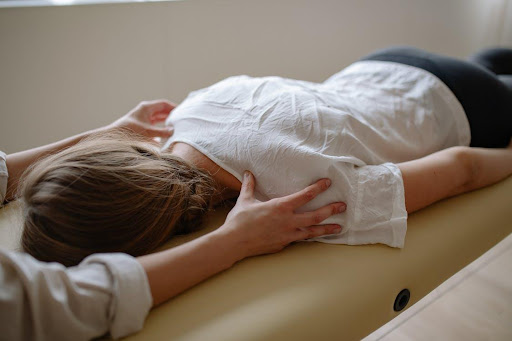
Living with arthritis can be challenging, affecting not only joints but also daily life and mobility. Physiotherapy Edmonton offers a personalized approach to managing arthritis, aiming to reduce pain, improve flexibility, and enhance overall quality of life. Physiotherapy clinics play a crucial role in managing arthritis by addressing both the physical and emotional aspects of the condition, helping individuals maintain an active and fulfilling lifestyle despite arthritis-related challenges.
Tips from Physiotherapy for Managing Arthritis:
1. Maintain Good Posture:
Practice proper posture to reduce strain on joints. This includes keeping your spine aligned and your shoulders relaxed, as well as avoiding slouching or hunching. Here’s how to practice proper posture to minimize strain on joints:
- Align Your Spine: Keep your spine in a neutral position to distribute the load evenly along your vertebrae. This reduces pressure on spinal discs and minimizes back pain.
- Relax Your Shoulders: Maintain relaxed shoulders to prevent unnecessary tension in the neck and upper back muscles. Avoid shrugging or rounding your shoulders forward, as this can exacerbate discomfort.
- Avoid Slouching or Hunching: Sit and stand tall, avoiding slouching or hunching over, which can strain your spine and compress joints. Use supportive cushions or chairs with lumbar support to maintain proper spinal alignment.
2. Use Joint Protection Techniques:
Protect your joints by using larger joints for heavy tasks, avoiding repetitive movements, and using assistive devices like jar openers or ergonomic tools to reduce strain.
- Use Assistive Devices: Employing assistive devices can significantly reduce joint strain. Examples include jar openers, ergonomic tools, and adaptive equipment like long-handled reachers or splints. These tools help perform tasks with less stress on joints, promoting independence and reducing discomfort.
- Practice Joint-Sparing Techniques: Physiotherapists teach specific techniques for performing daily activities with minimal joint stress. For example, using proper body mechanics when lifting objects—bending at the knees instead of the waist—can protect your spine and lower limb joints.
3. Plan and Prioritize Tasks:
Divide tasks into smaller, manageable steps and pace yourself to prevent overexertion. Prioritize activities to focus on what’s most important and spread tasks throughout the day.
- Pace Yourself: It’s crucial to pace activities throughout the day to prevent fatigue and joint pain. Physiotherapists recommend alternating between periods of activity and rest. Take breaks between tasks to allow joints to rest and recover.
- Use Time Management Techniques: Techniques like time-blocking or scheduling specific tasks for certain times of the day can help manage energy levels more effectively. This allows for efficient use of high-energy periods and conserves energy during times of fatigue.
4. Warm-Up and Cool Down:
Before engaging in physical activities or chores, perform gentle warm-up exercises to increase circulation and prepare muscles and joints. Afterward, cool down with stretching to maintain flexibility and prevent stiffness.
Warm-Up Exercises:
- Joint Mobilization: Gentle, circular movements of the joints such as wrists, elbows, shoulders, hips, knees, and ankles to increase synovial fluid production and joint lubrication.
Cool-Down Exercises:
- Foam Rolling or Self-Myofascial Release: Utilizing a foam roller or similar tool to apply gentle pressure to muscles and fascia, aiding in muscle recovery and reducing post-exercise soreness.
5. Manage Pain and Inflammation:
Apply heat or cold therapy as advised by your physiotherapist to alleviate pain and reduce inflammation in affected joints.
Ultrasound Therapy:
- Therapeutic ultrasound uses sound waves to generate deep heat within tissues, promoting circulation, relaxing muscles, and reducing inflammation. It can be effective in managing discomfort and stiffness associated with arthritis.
Electrical Stimulation:
- TENS (Transcutaneous Electrical Nerve Stimulation) devices deliver electrical impulses to nerves or muscles, which can help alleviate pain, reduce muscle spasms, and improve circulation in arthritic joints.
6. Modify Activities:
Modify activities to reduce joint stress. For example, adaptive equipment like a shower chair or long-handled reacher can be used to minimize bending and reaching.
Ergonomic Adjustments:
- Making adjustments to workstations, kitchen setups, and household environments to promote better posture and reduce joint strain. This includes using ergonomic chairs, cushions, and adjustable desks to maintain proper alignment and reduce stress on joints.
7. Get Adequate Rest:
Balancing activity with rest is crucial to prevent overuse and fatigue in managing arthritis. Adequate rest allows joints to recover and reduces the risk of exacerbating symptoms. Ensure you prioritize sufficient sleep, as it supports overall joint health and aids in the body’s natural healing processes.
8. Stay Active:
Staying active with arthritis is beneficial for maintaining joint mobility, muscle strength, and overall physical function. Engaging in low-impact exercises recommended by your physiotherapist, such as swimming, cycling, or walking, helps strengthen surrounding muscles that support the joints. These activities improve joint stability and flexibility while minimizing impact on sensitive joints.
9. Maintain a Healthy Weight:
Additional weight increases additional strain on weight-bearing joints such as the knees, hips, and spine. In Edmonton, physiotherapy offers guidance on nutrition and exercise to support achieving and maintaining a healthy weight, which can reduce joint pain and improve mobility.
10. Seek Support:
Seeking guidance from your physiotherapist is invaluable in managing daily activities with arthritis. Physiotherapy in Edmonton provides personalized advice on adapting your routine to better accommodate arthritis symptoms, including specific strategies for reducing joint strain during activities of daily living.
Achieving Freedom from Arthritis Pain:
Physiotherapy in Edmonton offers a holistic approach to managing arthritis, enhancing mobility, and improving quality of life. Through personalized exercises, manual therapy, and education, our physiotherapy programs at In Step Physical Therapy in Edmonton aim to alleviate pain, strengthen muscles, and promote joint flexibility. By working closely with experienced physiotherapists, patients can regain independence and embrace an active lifestyle.
For personalized arthritis management that addresses your specific needs, consider searching for a physiotherapist near me and it will help you experience these benefits firsthand and guide you towards optimal health.

